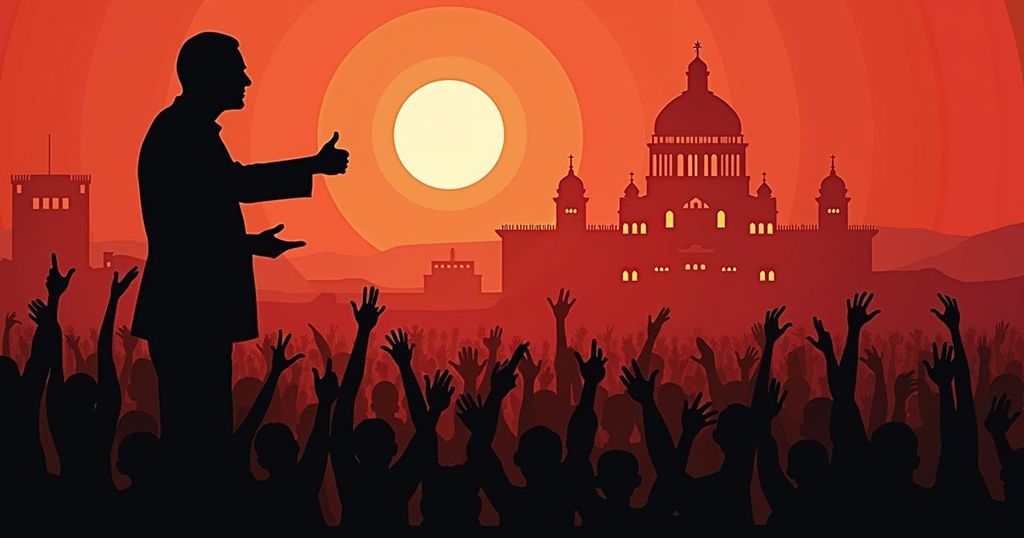Kais Saied’s Second Term: A Step Towards Further Authoritarianism in Tunisia

Kais Saied is likely to win a second term in Tunisia following a presidential election criticized for lacking credibility. An exit poll indicates he received 89.2% of the vote amid a historic low turnout of less than 28%. Significant challengers have been excluded from the race, with most opposition figures either imprisoned or barred from participating. Saied’s presidency has seen increasing authoritarianism and economic crises.
Incumbent President Kais Saied appears poised to secure a second term in Tunisia following the recent presidential election held on Sunday evening. As the polls closed, an exit poll released on national television indicated Saied received a commanding 89.2% of the votes cast. However, this election has been overshadowed by serious concerns regarding its legitimacy, particularly with a historic low voter turnout of less than 28%, the weakest since the 2011 revolution that ignited Tunisia’s democratic transition. Saied’s main opposition consisted of former lawmaker Zouhair Maghzaoui, who reportedly garnered roughly 3.9% support after previously endorsing Saied’s power consolidation in 2021. The other contender, Ayachi Zammel, an obscure businessman imprisoned for allegedly forging signatures to qualify for candidacy, likely received about 6.9% of the vote. The absence of significant rivals stemmed from an election process seen as heavily manipulated, with opposition leaders either incarcerated or disqualified by an electoral body appointed by Saied. Notably, prominent figures such as Rached Ghannouchi, head of the Ennahdha party, and Abir Moussi, leader of the Free Destourian Party, have been subjected to legal actions compromising their political participation. This troubling backdrop has led to labeling this election as a regression to authoritarianism. Since taking office in 2019, President Saied has dissolved the parliament and amended the constitution, steps that have raised alarms about diminishing democratic freedoms in Tunisia. Human Rights Watch has reported over 170 detentions of individuals primarily due to political dissent or the exercise of fundamental rights. Saied has steadfastly denied accusations of dismantling democracy and criticized his opponents as traitors. Amid rising discontent owing to economic turmoil marked by food shortages, infrastructure failures, high unemployment, and inflation, Saied’s administration has faced mounting pressure. His refusal to agree to unpopular austerity measures needed for an International Monetary Fund (IMF) loan has further complicated the situation. Tunisia now relies significantly on recovering tourism and assistance from the European Union, which ties its support to stricter migration controls.
Tunisia, often regarded as the origin of the Arab Spring, experienced a significant transition towards democracy following the ousting of long-time authoritarian leader Zine El Abidine Ben Ali in 2011. Despite initial successes in democratization, the political landscape has deteriorated under President Kais Saied, who rose to power in a landslide election in 2019. Saied’s administration has been marked by a consolidation of power, suppression of dissent, and a retreat from democratic norms, prompting allegations of authoritarianism. Recent political maneuvers, including the exclusion of substantial political competition and the imprisonment of opposition leaders, highlight the disintegration of democratic structures in Tunisia. Furthermore, the country has been grappling with severe economic challenges, suggesting that Saied’s presidency may be increasingly characterized by political and economic instability.
The recent presidential election in Tunisia has underscored the troubling trajectory of President Kais Saied’s administration away from democratic principles, characterized by significant political repression and an overwhelming lack of credible opposition. With Saied likely obtaining a second term amidst accusations of electoral manipulation and a catastrophic low voter turnout, the future of democracy in Tunisia remains precarious. Furthermore, the combination of political conflict and escalating economic distress poses significant challenges to the nation’s stability, raising urgent questions about the effects of Saied’s policies on Tunisia’s democratic aspirations and overall well-being.
Original Source: www.dw.com







